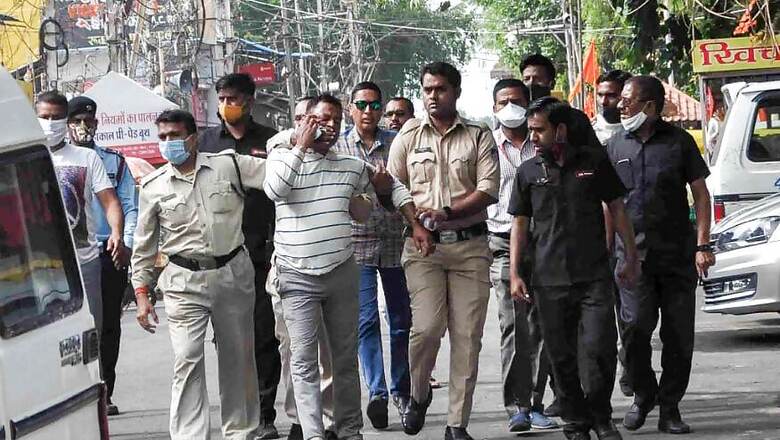
views
From committing his first murder in 1992 to he and his henchmen gunning down eight valiant men of the Uttar Pradesh police force, dreaded gangster Vikas Dubey had walked a long, bloody path.
With a criminal career spanning three decades, Vikas had probably signed his own death warrant. But the question is how did a small-time goon go on to build a major crime network and call the shots for so many years? His is the classic case of how gangsters and dons are born out of political greed and patronage, corrupt officials, and a system which is easy to exploit with money and muscle power.
With Vikas's death in police encounter, the larger question now is whether those among the politicians, the police and in the courts, who frequently shielded and patronised him, will ever be held accountable.
RISE OF THE BAHUBALI
The late 1980s and early '90s were the heyday of emerging caste consciousness both among the Dalits as well as the backward castes. This often led to clashes of egos and minor skirmishes among upper caste men and the lower castes. It was precisely during this period in 1990 when Vikas as a 20-year-old was first dragged to the police station after he had beaten some men from another caste for allegedly insulting his father. This was a moment when some police action might have taught the rowdy youth a lesson, but it was lost as local heavyweights intervened and got him released, without a case being registered.
The foundation in the field of crime was thus laid. Just a year later, in 1991, the first case was registered against him under section 323 (voluntarily causing hurt) and 506 (criminal intimidation) of the Indian Penal Code (IPC). The very next year, in 1992, Vikas hit the headlines by murdering two Dalit men. This was the first case of murder against him, registered at the Chaubepur police station of Kanpur.
Vikas was arrested, sent to jail, but was soon out on bail. For a section of upper castes, he was a symbol of pride. As his clout increased, Vikas slowly started getting political patronage. He also became a role model for many youths, and was soon able to garner a small but dedicated army of henchmen.
A LOOSE CANNON EVERY POLITICIAN WANTED TO USE
From 1992 to the next few years, as Vikas consolidated his hold in the region, he also emerged as a loose cannon, who was driven by his own motives and flamboyance. Having gained roots in the complex caste dynamics of those times, Vikas was also not shy of shifting political loyalties. As a result. he was eyed by politicians of all shades, but particularly those from the BSP and the BJP.
Competing politicians in the region approached him and Vikas continued to shift sides according to political convenience. He was important both for securing votes in the region as well as facilitating land and business deals through his network. This political patronage also helped him to often keep the police at bay or cultivate his own sources within the men in uniform.
In 1996, Vikas even joined the BSP after his mentor Harikishan Srivastava switched to the party from the BJP. Vikas emerged as a key aide of Harikishan in the area of Shivli and the surrounds.
MURDERER TURNS DON
It was the year 2000 that saw the real making of the don. Vikas Dubey gunned down Sidheshwar Pandey, the principal of the Tara Chand Inter College in Shivli town. The sensational murder was committed over a land dispute. Even before the heat in the case could die down, the very next year, Vikas did something unimaginable.
He murdered Santosh Shukla, a senior BJP leader with status of a state minister, inside the Shivli police station. The present union defence minister Rajnath Singh was the chief minister of Uttar Pradesh at the time.
The murder was said to be the political fallout of an old rivalry between Harikishan Srivastava and Santosh Shukla. In a previous election, Srivastava as the BSP candidate had defeated Shukla, a BJP nominee from Chaubepur. The two aspirants had fought each other in the 1996 assembly polls and Vikas was a key member of Harikishan's team for the BSP. During the campaign itself, Vikas had attacked a key political aide of Shukla.
A BJP leader’s murder inside a police station, coupled with fact that the police failed to arrest him as Vikas surrendered in court, built greater infamy around his name. There was no looking back after that, as Vikas moved forward, amassing wealth and building a well-oiled network of moles and aides.
SLOW LEGAL TRIALS AND ACQUITTALS
As his criminal history continued to grow, touching around 60 odd cases of heinous crimes registered against him, Vikas continued to wade successfully through legal battles with the help of his political connections, muscle and money power, and associates within the system. Witnesses turned hostile and complainants denied charges in courts. No surprise then that he was acquitted in the murder that he was accused of committing inside a police station. How remarkable that no policemen saw him doing it.
The only murder case he was convicted in was that of Sidheshvar Pandey. But the conviction order was stayed by the Allahabad high court and Vikas was out on bail.
ADVENT OF YOGI SARKAR AND THEREAFTER
In March 2017, the BJP came to power in Uttar Pradesh and Yogi Adityanath became the chief minister. He soon declared a stern policy of zero tolerance towards organised crime and the mafia. Soon, encounters became a new norm. A bounty of Rs 25,000 was declared on Vikas Dubey, which which later raised to Rs 2.5 lakh and on Wednesday was increased to 5 lakh. He was also arrested by the UP special task force (STF), but the don was soon able to come out on bail.
Sources say since then Vikas was trying to enter the Bharatiya Janata Party. There was a section of BJP leaders that was backing his case. The efforts, however, were stonewalled by a senior party functionary in Delhi who have a family connection with the late Santosh Shukla.
The fact that genuine inputs from the likes of deputy SP Devendra Mishra, who was among the eight policemen killed, were being ignored by the higher-ups is clear indication of some support coming in for Vikas from people who matter even in administration.
But after the killing of eight policemen, and UP CM himself monitoring the investigation in the case, the escape routes had hit a dead end for the man who liked calling himself the "don of Shivli".


















Comments
0 comment